The new AUDL franchise has an ambitious plan to change the way people see ultimate – and the team hasn’t even played a game yet.
March 28, 2016 by Cameron Albert-Deitch in Analysis, Interview with 10 comments
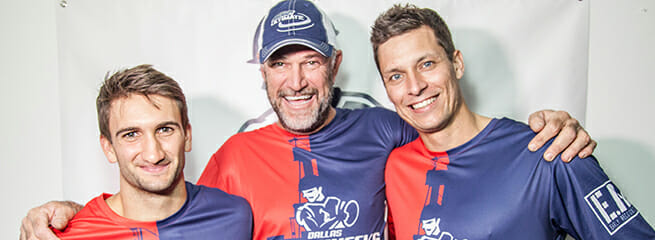
In most sports, expansion teams never compete right away. Baseball’s Miami Marlins, established in 1993, took four years to reach their first postseason berth. It took nine years for football’s Houston Texans. Same for the Columbus Blue Jackets in the NHL.
Professional ultimate probably isn’t established enough to fit that bill. The first three AUDL titles were won by first-year teams, a streak that only ended last year when the San Jose Spiders repeated as league champions. As is the case for many fledgling professional sports leagues, the team list remains in flux year-to-year, with new franchises joining and folding each season. Last year, the league’s entire South division was brand-new.
So it might not be surprising that the most-talked about professional ultimate team over the past few months—the Dallas Roughnecks—has yet to step on the field or play a single game. Why? An all-star roster helps, including college stars like Texas A&M’s Dalton Smith and Matt Bennett, longtime Boston standout Brandon Malacek, and most recently, social media and reality television star Brodie Smith—a multi-time Club champion in his own right
But the expected core of the team is made up of five players from the U.S. National Team competing at the 2016 World Ultimate and Guts Championships in London this June: Beau Kittredge, Cassidy Rasmussen, Jimmy Mickle, Dylan Freechild, and Kurt Gibson.
Here’s how that core came together.
November 3, 2015: Beau Kittredge
The AUDL announced their plan for a team in Dallas in July 2014, but 56-year-old Roughnecks co-owner Jim Gerencser knew about it months in advance.
In early 2014, before the Roughnecks’ existence was officially confirmed, Gerencser sat Beau Kittredge down over drinks at a San Francisco bar and cut right to the chase. “As soon as there’s an AUDL team in Dallas, I want you on that team,” he said.
Kittredge, who has lived, worked, and played in the Bay Area for the past eight years, didn’t take it too seriously. “This old crazy dude thinks he’s going to be able to do whatever he wants, huh?” he thought to himself.
But then, the two started working together on Early Recognition Is Critical (E.R.I.C), Gerencser’s cancer awareness nonprofit and official charitable partner of the AUDL1. As the partnership progressed, Gerencser would regularly repeat that he wanted Kittredge on his potential Dallas team.
This past September — with the Roughnecks preparing for their first season of competition in the AUDL South Division — Gerencser, a consummate salesman, really started to work on Kittredge. Where do you think ultimate is going? Gerencser asked. Is the community at maximum capacity, or can we work with sponsors, large corporations, and big schools to make ultimate accessible to those who’ve never experienced it?
The same questions had been on Kittredge’s mind for years. Gerencser sold Kittredge on a vision of changing the way ultimate is presented to fans, the way people see the sport – not as a niche game but something worthy of mainstream appeal. And to build a fanbase that isn’t only made of other ultimate players, he needs a winning team.
Kittredge did, of course, have some conditions. He wanted to prioritize the U.S. National Team over the Roughnecks. He also wanted some control over the final roster, effectively requesting to be a co-general manager.
Gerencser accepted, proposing that Kittredge move to Dallas and take on a job with his company, Nationwide Auto Services. Kittredge now works in creative development for Nationwide – with “a pretty easy day-to-day,” according to Gerencser – but he spends most of his time and energy preparing for the AUDL season.
Gerencser would also help Kittredge with housing – though some other pieces needed to fall into place, first.
November 5, 2015: Cassidy Rasmussen
The first person Kittredge started recruiting once he joined the Roughnecks – even before he made it official – was his then-roommate, San Francisco Revolver captain (and Ultiworld’s 2015 Club Player of the Year) Cassidy Rasmussen. The angle: This is a team that will invest money in helping you become the best athlete you can be.
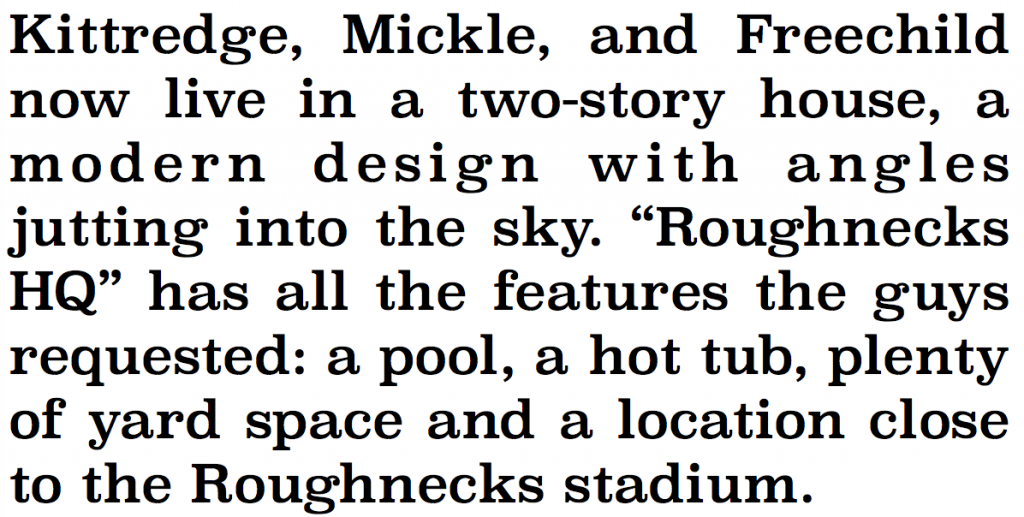 “I made him do a really hard lifting workout, and then asked him when he was really tired,” Kittredge laughs. “A bunch of heavy deadlifts, and when he was probably a little lightheaded, I was like, ‘You know…’”
“I made him do a really hard lifting workout, and then asked him when he was really tired,” Kittredge laughs. “A bunch of heavy deadlifts, and when he was probably a little lightheaded, I was like, ‘You know…’”
“That’s… accurate,” Rasmussen ruefully admits. “I didn’t immediately oppose it, or anything of that nature. I was in the middle of a workout!”
Soon, they started talking details, with Kittredge as liaison between his roommate and team ownership. Rasmussen, who wasn’t willing to move to Dallas for the season, needed to know how much travel would be involved2. Would his contract have attendance requirements? (It does not.) Can he prioritize the U.S. National Team? (He can.) What’s the salary? (He won’t say, but apparently, it’s enough.)
Rasmussen was eventually convinced by an office break room conversation where his boss – Revolver co-captain Ryo Kawaoka – told him not to pass up this kind of opportunity.
Gerencser happened to be in San Francisco at the time, preparing for a mid-November trip to the Philippines with Ditch media and an American all-star team dubbed “Team E.R.I.C.” He swung by Kittredge and Rasmussen’s house, and they held a signing party on the roof.
After signing, Rasmussen says, the talk around the house shifted to recruiting strategies for two other marquee players, both of whom were going to the Philippines with Kittredge and Gerencser as part of Team E.R.I.C.: Jimmy Mickle and Dylan Freechild.
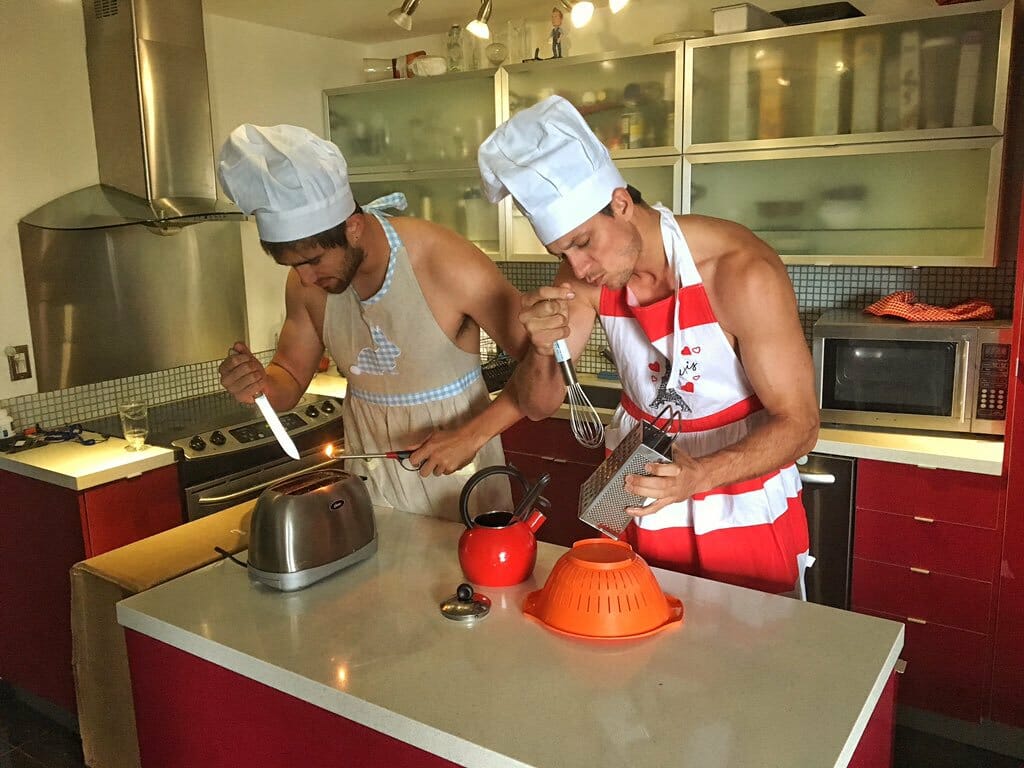
December 1, 2015: Jimmy Mickle
Mickle had been one of Gerencser’s targets since September 2015, just before Club Nationals. Kittredge had also talked to Mickle about the possibility of playing together for Dallas, before he even signed.
“He was like, ‘I think I’m going to go for this,’” Mickle remembers. “And I was like, ‘Interesting.’ And then he laid out all his reasons, and I was like, ‘Those are pretty good reasons.’”
But it took the three men spending a week together abroad to finally convince Mickle. First, Kittredge asked Mickle over drinks at the rooftop bar of their Manila hostel: “Who do we have to get on the team to make you happy? If you could pick any player on Johnny Bravo, who would it be?”
“Ben Lohre,” Mickle replied.
“That’s not even a player on Bravo that I’ve heard of,” Kittredge said. “There’s no way we can pick just a random person.”
“Lohre’s becoming one of the best players on Bravo,” Mickle insisted. “He’s going to work hard.”
“I do like hardworking players,” Kittredge mused, before agreeing to invite Lohre to tryouts.3
Still, Kittredge and Gerencser thought Mickle wasn’t coming to a decision quickly enough. Mickle had come to the Philippines for a vacation, while the two Roughnecks recruiters meant business. They decided to speed up the process. They brought Mickle back to one of the hotel rooms, kicked everyone else out, and locked the door. “We’re not opening this door until we come to an agreement,” Kittredge told Mickle. “And it’s going to be settled right now.”
How long was Mickle locked in the hotel room? “It wasn’t that long,” Mickle says. “I’m kind of claustrophobic, so I was ready to get out of there.”
Mickle, like Kittredge, also agreed to move to Dallas and take on a job at Nationwide4 for the duration of the season as part of a commitment to creating a team with chemistry. He also took the lead on recruiting Freechild.
January 12, 2016: Dylan Freechild
Freechild has vocally boycotted professional ultimate since the AUDL’s inaugural season in 2012 – he’s not a fan of the referees, the field size, or the yardage penalties. The latter two are superficial changes, he says, only in place to differentiate professional ultimate from the college and club game. And the former, that’s a sea change for the sport. The odds of convincing him to join the Roughnecks didn’t look good.
It just so happened that right around the time Gerencser was trying to piece the Roughnecks together, Freechild started to waver on that stance. Freechild credits his friend Kevin Minderhout – of Ditch, formerly NexGen, who also went on the trip to the Philippines – for pushing him over the edge, and lists three reasons he’s decided to give professional ultimate a try.
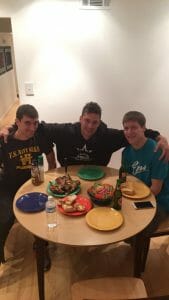
First, tryouts for the U.S. National Teams were coming up, and Freechild was concerned that if he made the team, he might not have the finances to make the trip to London. Getting paid to play in the AUDL would offset some of that expense.
Second, he says, USAU’s observers are becoming more like referees, eliminating one of the main differences between club and professional ultimate.
Third, Freechild wants to have a stronger voice in the ultimate world as the sport grows. He believes playing professional ultimate – even if just for one year — lends him some extra credibility.
How, then, did Freechild end up moving to Dallas, helping Gerencser with Roughnecks-related marketing and merchandise activities, planning on working nights at a restaurant to support the move? Roughnecks fans can thank Mickle for that. The two have been friends since they played the U.S. Junior National Team together in 2010 – and everyone loves being teammates with their friends. “He wanted another chapter in the Dylan and Jimmy book,” Freechild says.
Kittredge, for his part, also claims an active role in recruiting Freechild – a statement that makes Freechild laugh.
The three players can hash it out during the season while sharing a house together, courtesy of Gerencser and the Roughnecks organization. Kittredge, Mickle, and Freechild now live in a two-story house, a modern design with angles jutting into the sky. “Roughnecks HQ” has all the features the guys requested: a pool, a hot tub, plenty of yard space and a location close to the Roughnecks stadium. And they’re all there for the same purpose: to build chemistry and train together as a team in a way that other AUDL teams with out-of-town stars can’t do.
“We’re going to create an image that we’re actually superstar professional athletes,” Kittredge says. “And maybe some people will actually believe it, and we’ll go from there. Maybe we’re not faking it – maybe we actually did make it. Who knows?”
January 12, 2016: Kurt Gibson
Out of the entire Roughnecks roster – not just the five stars who are going to Worlds – Kurt Gibson was probably the easiest signee. The pieces were already in place: Gibson lives in Dallas, and Gerencser had been preaching the gospel to him ever since the two men started chatting while watching the finals of Lei Out 2014. It doesn’t hurt that he lives in a house owned by Gerencser.
“What do you think about an AUDL team?” Gerencser asked Gibson. “What do you think about playing with Beau?”
Gibson remembers Gerencser mentioning it multiple times over the years. “I’m trying to get Beau to play,” he’d tell Gibson. “I think Beau’s going to play.”
“Well, yeah, that’d be great,” Gibson would respond, but he never thought much of it.
Gibson has spent the past two pro seasons commuting to San Jose and San Diego, and spent the 2014 Club season playing (and winning a championship) for Denver’s Johnny Bravo – so the allure of a championship-caliber team practically in his backyard is strong. Ask him if he knows with certainty that he’d play for this team if his Worlds teammates hadn’t signed on first, though, and he pauses.
Kittredge thinks Gibson is being dramatic. “Kurt was on board before he was born,” Kittredge says. “He loves winning more than anything. He loves pro ultimate more than club ultimate5. Him getting on board? We didn’t even really have to do anything.”
Well, maybe one thing. See, he’s got a friend from college who also plays ultimate…
February 18, 2016: Brodie Smith
No, he’s not one of the five Roughnecks playing at Worlds, but Brodie Smith is undeniably the most recognizable ultimate player in the world. Shortly before the first round of Roughnecks tryouts on December 5-6, he contacted the Roughnecks through Gibson, his former University of Florida and Johnny Bravo teammate (and current Amazing Race partner). He wanted to play.
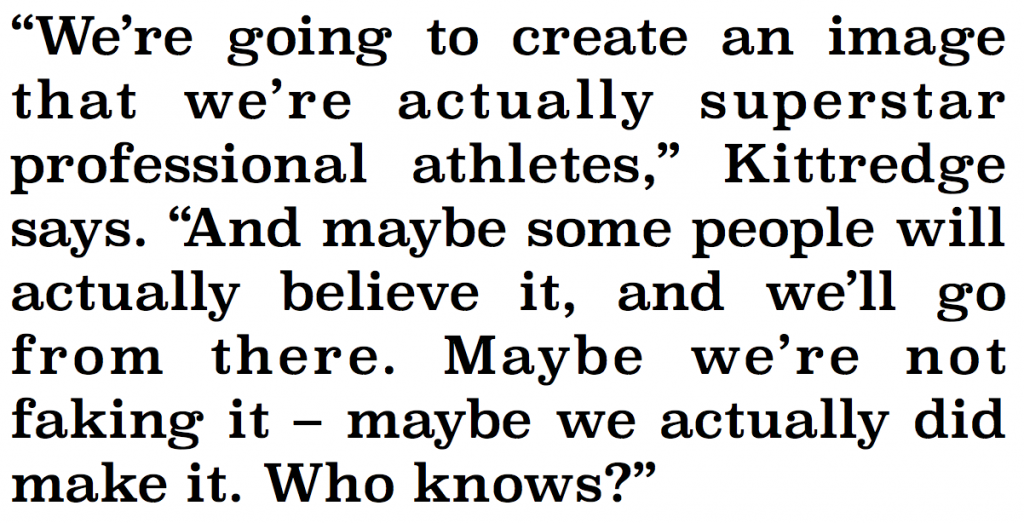 If Smith can stay healthy, he’s certainly talented enough to contribute on the field. His social media reach is similarly undeniable – and the Roughnecks’ top goal is to turn those who have never heard of ultimate into fans.
If Smith can stay healthy, he’s certainly talented enough to contribute on the field. His social media reach is similarly undeniable – and the Roughnecks’ top goal is to turn those who have never heard of ultimate into fans.
Yet after two months, several contentious emails, and multiple meetings – many of them in-person between Kittredge and Smith, who lives in Dallas – Kittredge wasn’t optimistic. He was fully aware of Smith’s very public persona and wasn’t sure their visions for the team aligned. But Brodie did have a powerful ally.
In early February, while chatting with Mickle about the lack of work necessary to sign Gibson, Kittredge couldn’t help mentioning how much work Gibson was doing to get Smith on the team.
“The only thing Kurt tries to do is get Brodie on the team – that is his sole mission,” Kittredge laughed. “In fact, he just tried to call me. We ignored his call because he’s trying to get Brodie on the team right now.”
Just over a week later, Smith announced the signing on Twitter, though many read about it first in a post on Kittredge’s blog titled, somewhat controversially, “Pride.”
“Like many, I don’t actually know him, but still harbor a certain resentment for him,” Kittredge wrote of Smith. “I guess I have a vision of ultimate being a beautiful sport, not just a gimmick for ads or an activity involving another sports goal (basketball hoops), or my beloved disc ending up where garbage goes (trash cans).”
According to Gerencser, it was just a matter of the two men getting comfortable with the situation. Kittredge, for his part, says he came to the realization that Smith’s presence brought more pros than cons to the table for growing ultimate.
Kittredge still fears that Smith will work more to promote his own brand than the Roughnecks brand. But his words from the blog post are fitting: “I shouldn’t hate someone who creates, I should help him create new things.”
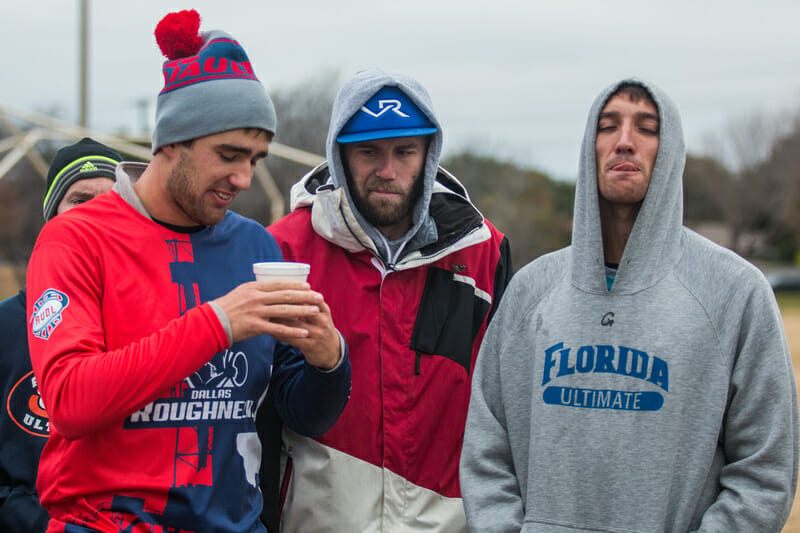
Drama Guaranteed
It makes sense: Kittredge sees his new teammates not just as good ultimate players, but as personalities. He sees his new team as a vehicle for entertainment more than winning – there were apparently three or four “really good” players (he and Gerencser both decline to name names) that wanted to join the team but were turned down in the name of competitive balance.
And he understands the value of drama – perhaps a little too well. “We’re going to keep it interesting,” he says. “If we have to fabricate some drama, if we have to cut Jimmy for a game or two because it’s not working out, or he’s not following his diet restrictions, we’ll do that.”
That’s the closest we may come to understanding the Dallas Roughnecks for now: not as just any new expansion team, but as a big experiment aimed at changing the way the world sees the sport. They certainly have the roster now to do it.
AUDL commissioner and Chicago Wildfire owner Steve Gordon calls them a beta test. “This time next year, if we’re talking about what happened to the team on the field, economically, from a marketing perspective, what was the public perception – all those things are going to be very interesting,” Gordon muses.
Does he have a prediction? Nope.
“They haven’t even played a game yet as a team,” he asserts. “I’ll be sitting on the edge of my chair, right next to you.”
Kittredge helps primarily with growth and outreach. ↩
His girlfriend travels during the week as a consultant, so weekends are often the only time they have together. ↩
You can’t make this stuff up. ↩
He works in “quality management,” according to Gerencser. ↩
For what it’s worth, Gibson won’t entirely concede this point. He sees pros and cons in each, preferring the competition level and field size currently available in Club, but appreciating the broadcast opportunities and improved player/fan experience offered by the AUDL ↩